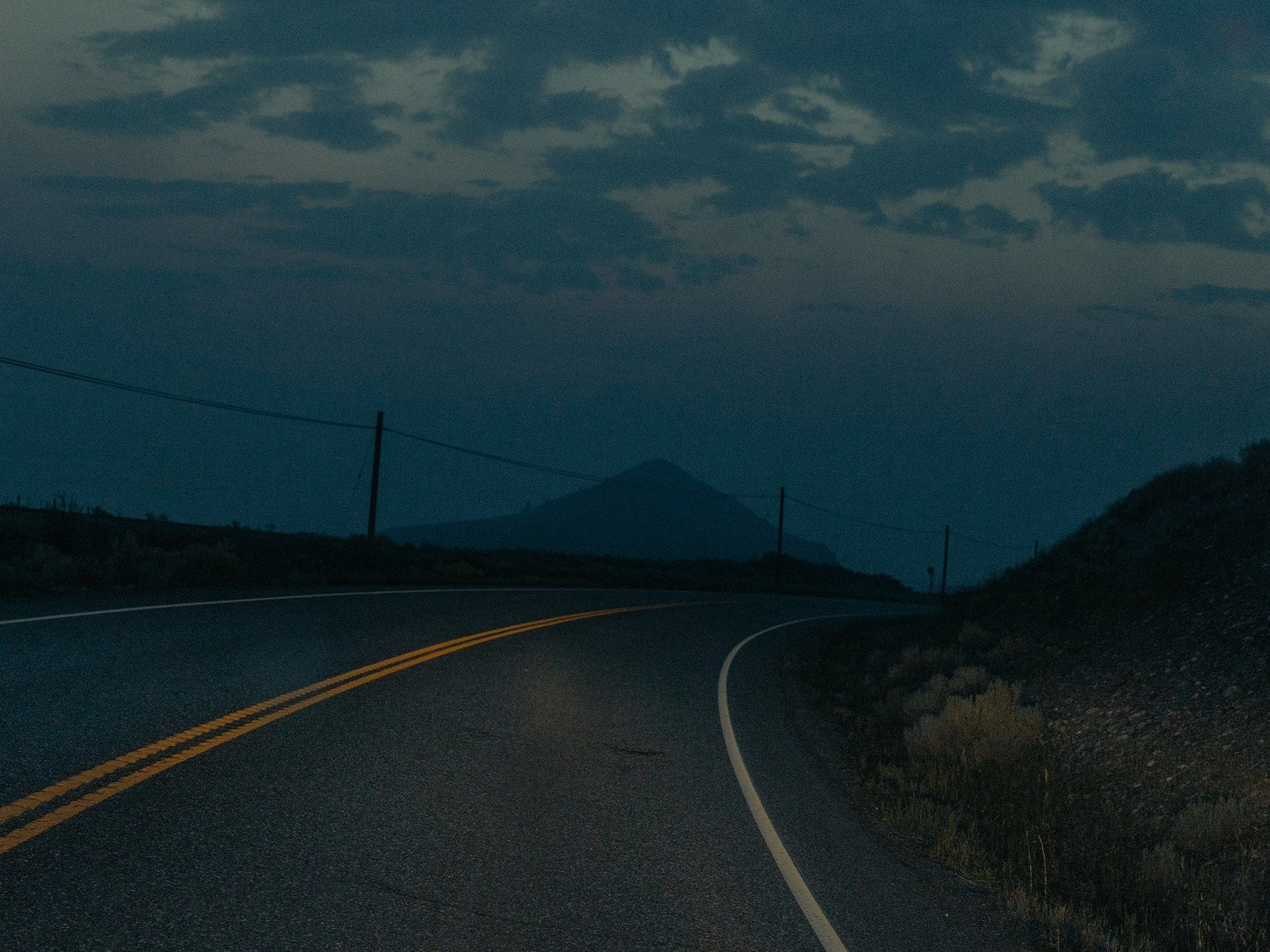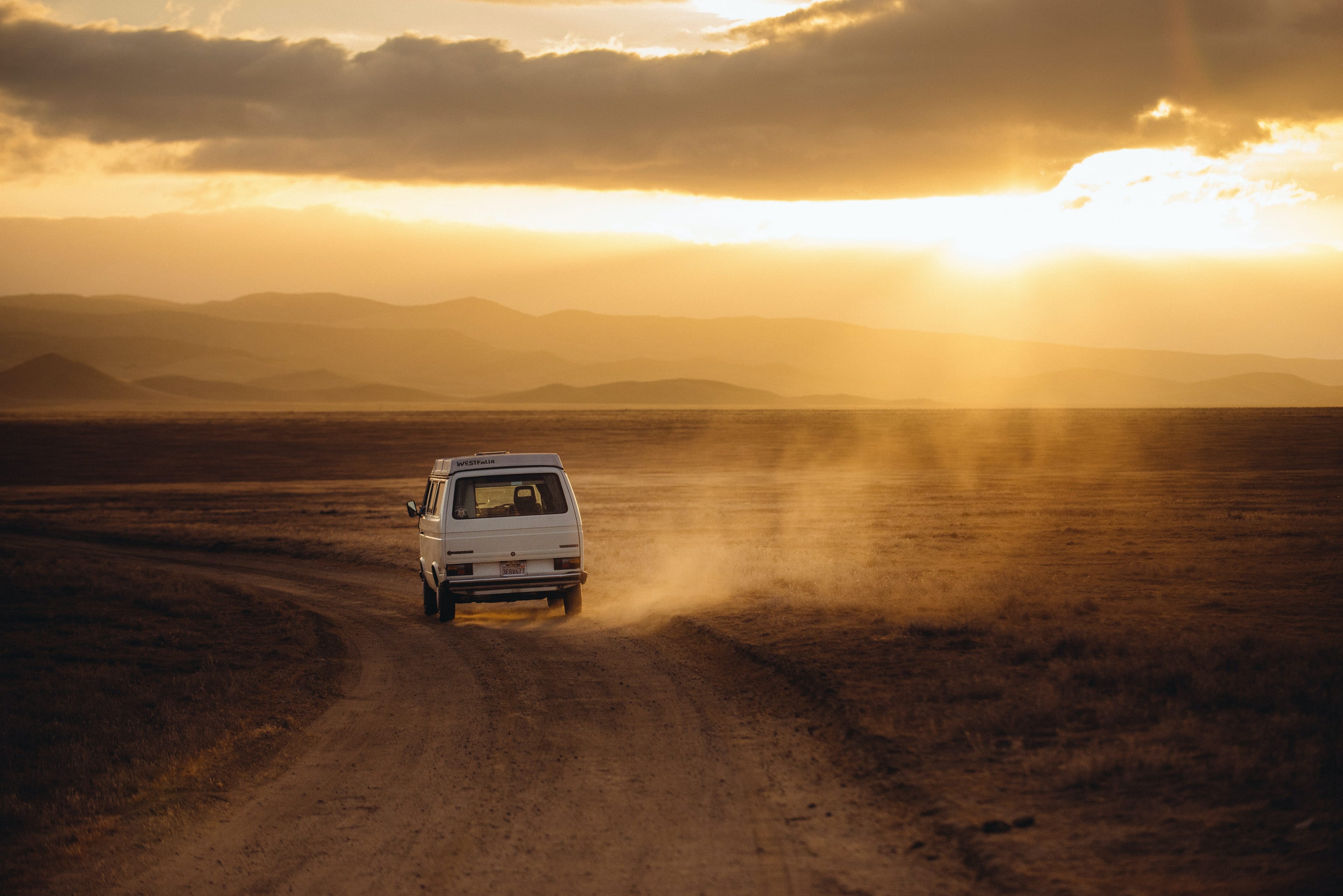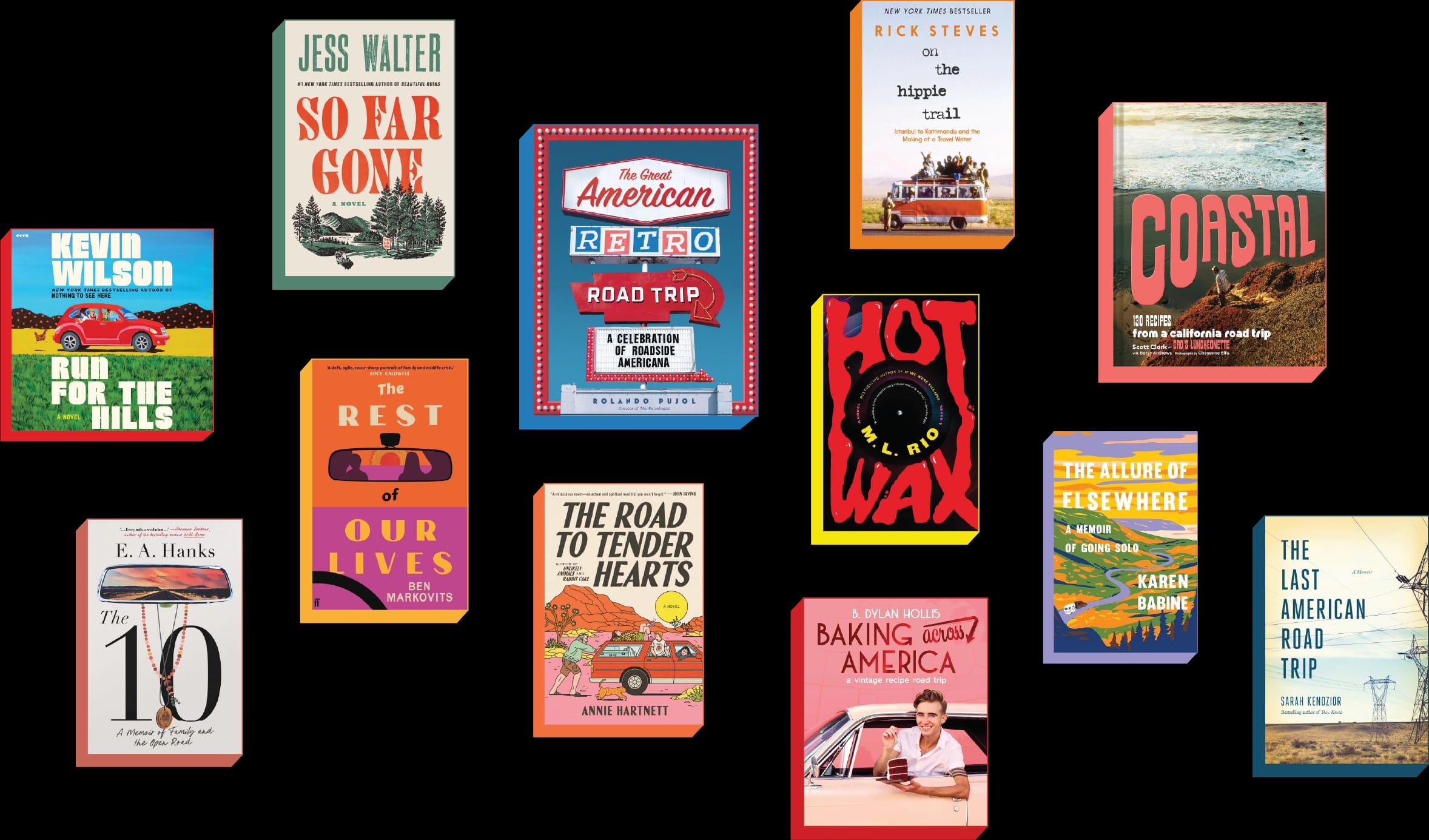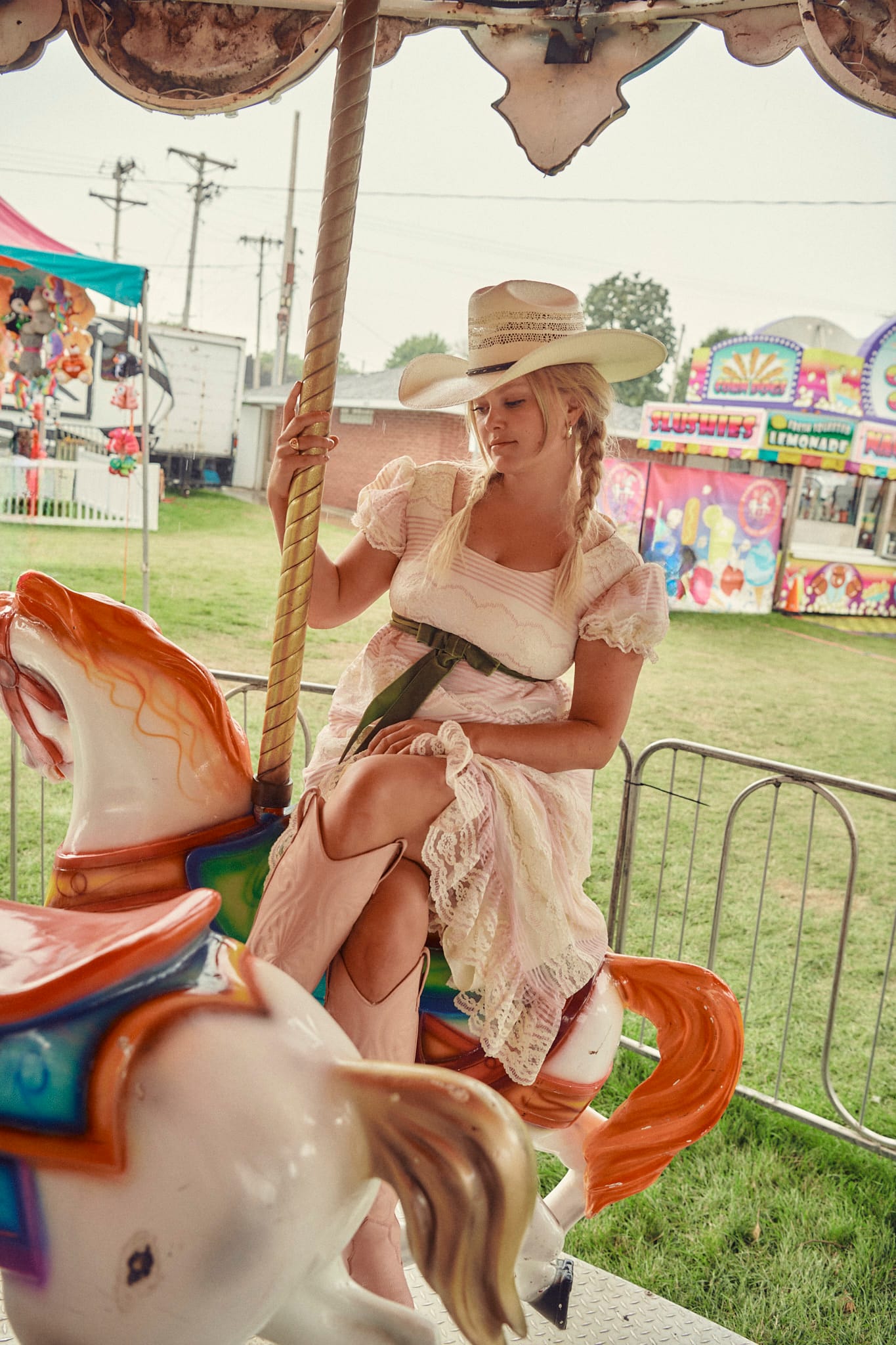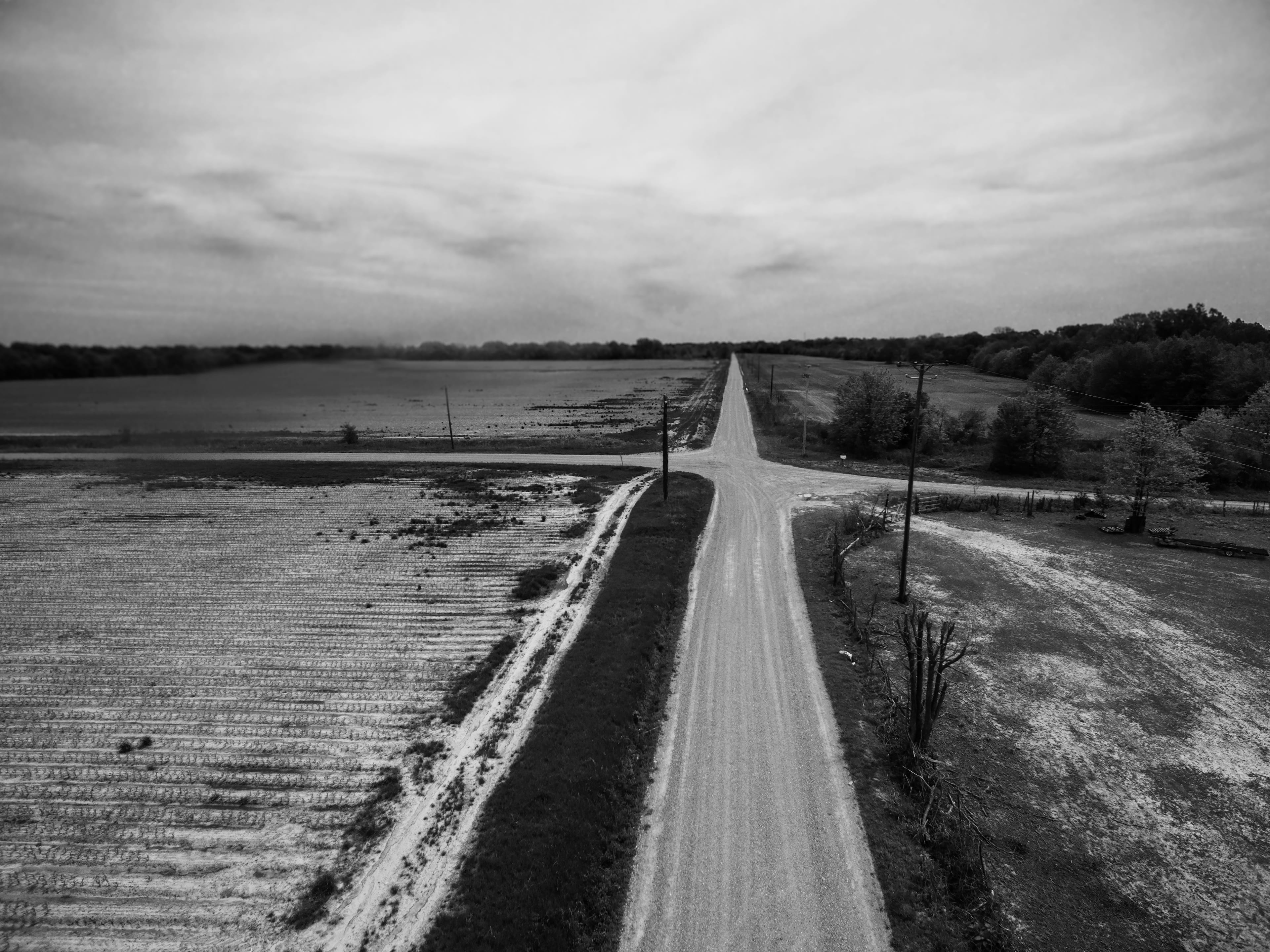
Crossroads | Will H. Jacks
The acclaimed sportswriter explores the mythic byways and timelines that intersect in his birthplace.
Stovall Road runs six and a half miles from the outskirts of my hometown to Highway 1. I turn up “When the Levee Breaks” in my truck and roll down the windows. Summer smells like defoliant. The road is named after the plantation that dominates the south side of the road, which is named after Colonel Stovall. The Colonel’s cotton stand, planted by his descendants, looks clean between the rows. He shot down six German planes in the Great War. An ace. He died six years before I was born. There he is sitting beneath the glowing Chinese lanterns hanging in his backyard. He waves and then disappears. Turns to dust in my imagination’s hand, which turns to topsoil and runs out through my fingers onto the white cotton bolls. Muddy Waters looks up from his porch and he turns to dust, too, along with his house, until it’s just a grassy rise along the road, everything slipping through my fingers, gone. Gone. All these roads were built to parallel the railroad tracks that turned swampland into the last cotton empire before petroleum reordered the manufacturing world and left Mississippi forever in the past. I love a Delta drive. Over time, to me, the main roads here have become one road, fingers on a hand, outstretched, trying and failing to hold time, dirt, ashes.
Hold out your right hand. That’s the Delta. Your fingers are the north-to-south mother roads. The pinkie is the river. The father of waters. The ring is Highway 1, which waits at the end of Stovall Road. The Great River Road. Moon Lake to Rosedale to Greenville, or Kathryn’s to the White Front to Doe’s. The bird, which feels about right, is Highway 61. A curse of a road. Memphis to Clarksdale to Rolling Fork. The Blues Highway. My family’s land sits between the ring and the bird. The pointer and the thumb are Highway 49 east and west, which bifurcates so that these four roads run the length of the Delta, a teardrop covering parts of 18 counties in the northwest part of the state.
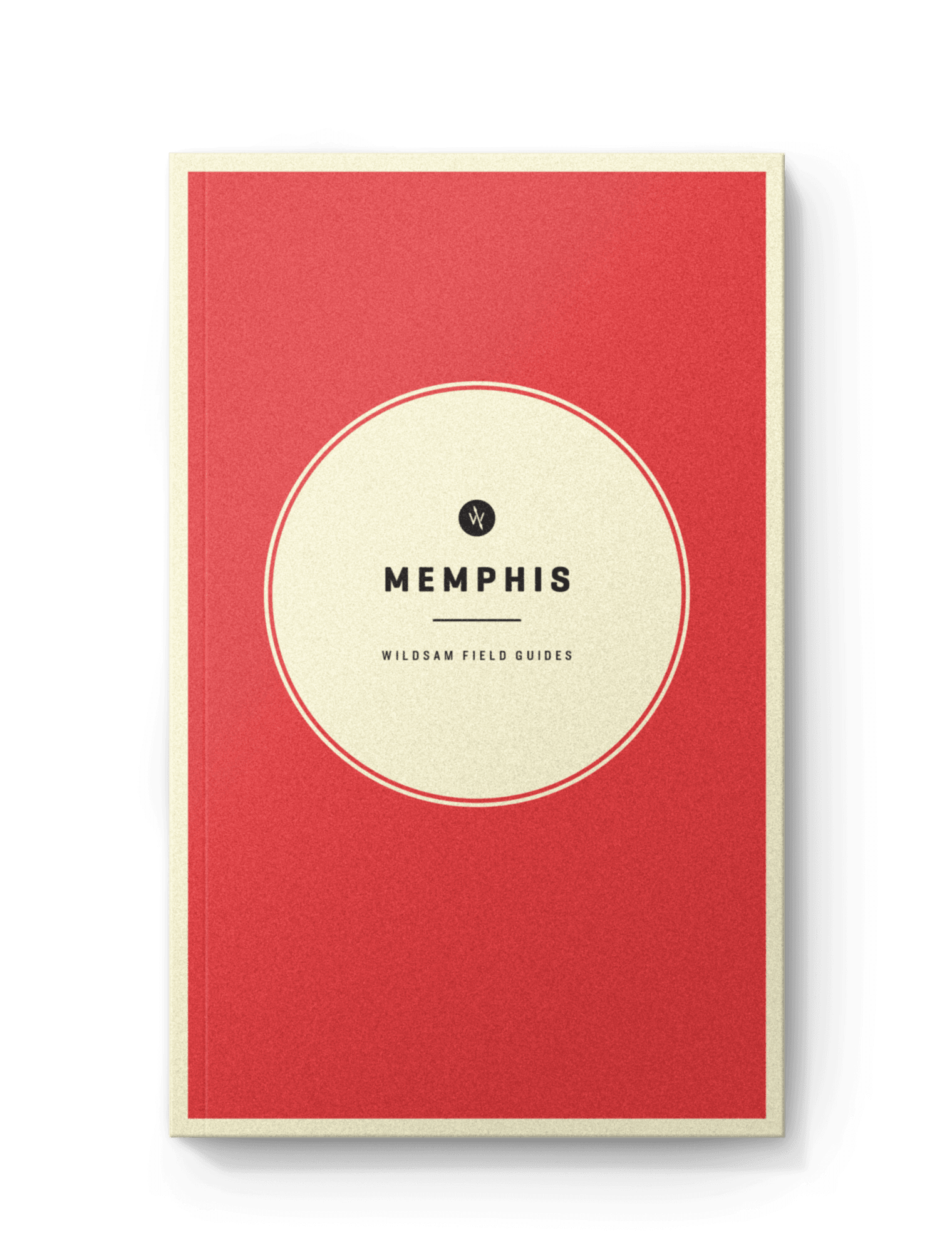
Memphis
Soul food and art museums, filmmakers and journalists, music history and neighborhood lore.
The main arteries are laced with state and county roads, with farm turnrows and gravel cut-throughs, so that in a region where most of the train tracks have been ripped up—a lot of them turned into torpedoes and destroyers and howitzer shells—the roads themselves are the landscape. Everything you see is manmade: the flat fields, which were drained and cleared swamps; the levee rising above everything; the reshaped and carefully designed rows and drainage systems; the unending roads connecting all of it. The Mississippi Delta is most of all, then, a place to drive, to time travel, and the less you concern yourself with the specific name of a specific stretch of blacktop or dirt, the better off you will be. Stop at country stores for bologna and hoop cheese on Wonder Bread, or for a clamshell of tamales, or for a Budweiser tallboy in a brown paper sack.
The Colonel got called up for the second war, and his young son became a fighter pilot, too. The younger Stovall flew P-47s out of Boxted, England. On Dec. 23, 1944, German planes shot up his aircraft and he limped back across the Channel to safety. Eight days later he went up again. Over Hanover, Germany, his two-plane formation ran into seven German Fw190s. He shot down two enemy pilots while bullets riddled his own aircraft. Damaged too badly to fly, he bailed out but did not survive. He died on the last day of 1944. The Colonel, stationed overseas, went looking for his son and eventually located his grave. He wrote a letter home to his wife on Stovall Road. “I have found our boy,” he wrote. “He is buried at the Evangelist cemetery at Burgsteinfurt. If you look on the map, you will see that it is about 10 miles northwest of Munster.”
The Colonel needed to make a decision: Leave his son there in Germany, or exhume him and return his remains to the farm. To Stovall Road. The Colonel decided to leave him in the foreign soil because someone who believes that dirt carries mystical properties would, of course, understand that disturbing a warrior’s grave, even for something as important as bringing a beloved son home, was disrespecting his courage and sacrifice. Loving one patch of dirt opens up all patches of dirt for love, just as loving one Delta road means that you have loved and driven them all.
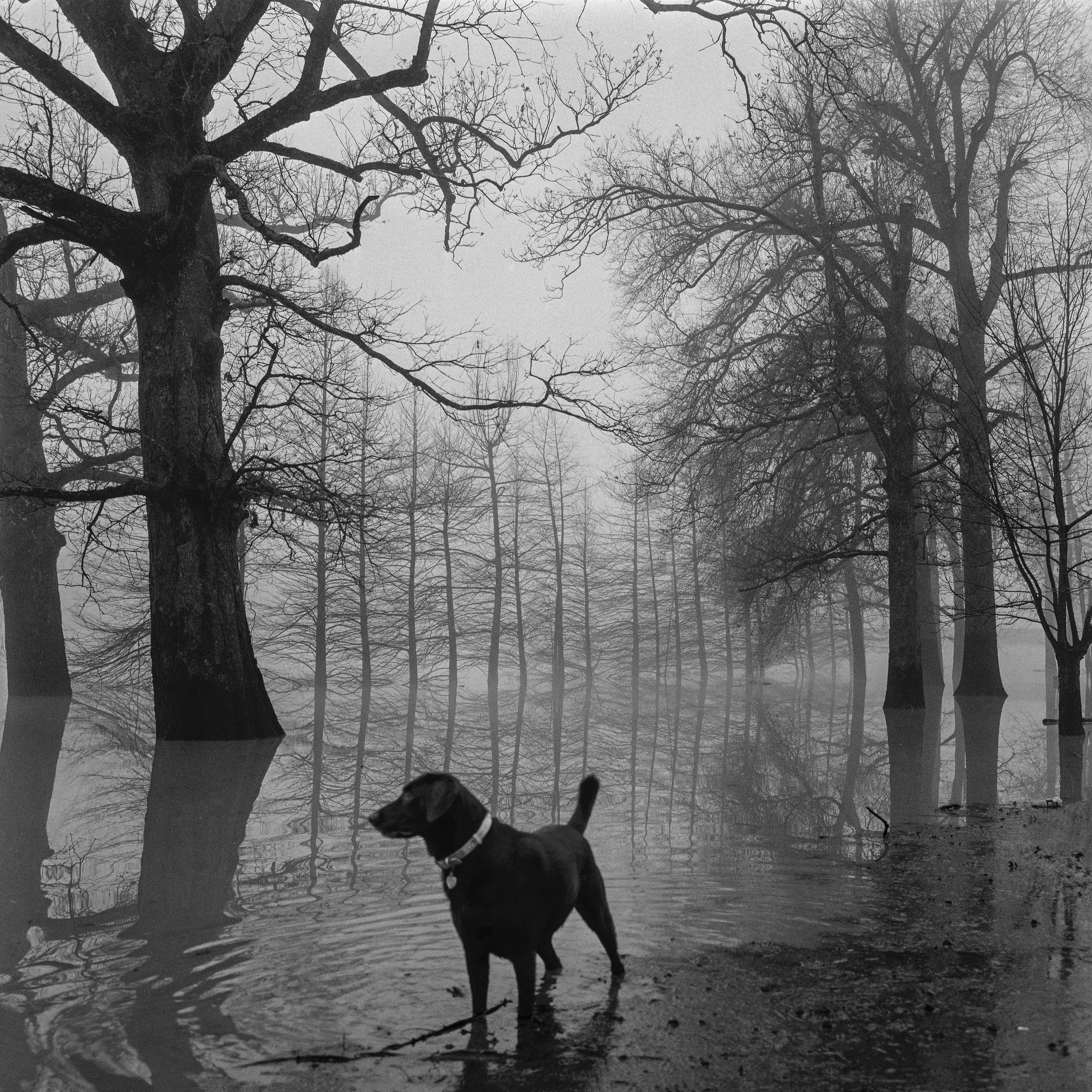
All the big Delta highways run through Clarksdale. Highway 61 and 49 intersect at Abe’s BAR-B-Q, where I order Big Abe chili cheese burgers and a Diet Coke with great ice. Highway 1 is just west of town, at the end of the six and a half miles of Stovall Road. Lucille at Abe’s always remembers my order, even though I haven’t lived there in decades. You can be absent for a generation and walk in, and everyone nods at you like you’d just stepped out to make a phone call. I didn’t know until I moved away that not everywhere worked like this—a place built on the baseline assumption that nobody ever leaves and nothing ever changes.
Before there was a Highway 1, a Highway 61 and a Highway 49, before there were railroad tracks, there was just virgin forest and a country desperate for all that wood. I believe the first man who crossed the future path of all three roads was an English lumberjack named Frank Hamilton. He went alone to set up camp and blaze a trail for his pregnant wife, Mary, and their kids to follow. They’d been living on Concordia Island on the river, near where Highway 1 passes through Perthshire now. Frank arranged for a wagon and driver to take her from Gunnison to Shelby, on what would become Highway 61, and from there eight miles further east to the Sunflower River, near Drew, which today sits on Highway 49. In the decade before the turn of the 20th century, this was wild country, not yet civilized and thinly settled at best. A small population of lumberjacks and stave makers huddled in small tent villages in the woods. Schlitz Brewing established a beer-barrel-making town. The secret of this bounty had, of course, spread far and wide, and men like Frank Hamilton had to go first.
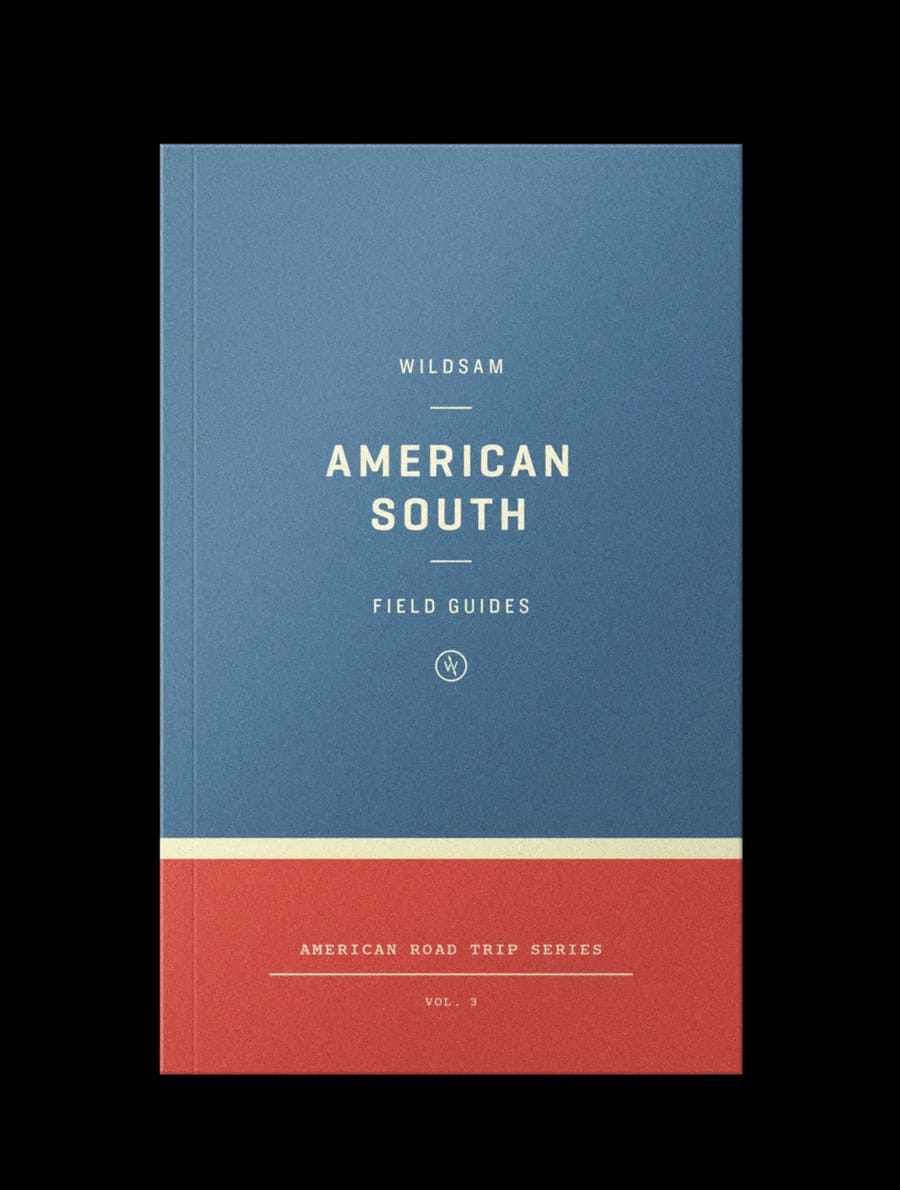
American South
Inside Wildsam's American South field guide, you'll find tales from prize-winning writers, past and present; detailed road trip itineraries and profiles of beloved Southern towns; interviews with chefs, art collectors, jazz icons and bourbon experts; delightful miscellany from the archives, selective recommendations about authentic experiences and offbeat intel that offers stunning insight into the South.
The kid driving the wagon took Mary Hamilton to the river crossing, where they used ropes to bring the boat back to their side and loaded aboard. She could tell the driver was nervous about the far side of the Sunflower, she wrote in a rediscovered memoir called Trials of the Earth. It was 1896. There was no road greeting them, just a tangle of timber, tall cane, blackberry vines and all sorts of plants she’d never seen before, even with her wilderness experience. Frank told her he’d leave little torn pieces of paper to mark the correct trail to their new home, but if he’d left them, they’d been blown away. Three different trails spread out across a 45-degree angle away from the bank into the darkness. Mary decided to guess. She and the driver loaded in the wagon and followed the middle trail for a long time, until she saw a sign nailed to a tree pointing up a trail. It read: “200 yards to F Hamilton Camp.”
She was home, and very pregnant, and found her husband and his men covered in sand gnat bites, their skin red with a terrible rash. That night they lit smoky fires and covered their heads in sheets and the gnats still got them. Mary got the men working on building a cabin, with rafters cut from a big oak tree and river wood for the roof. Frank worked turning raw timber into barrel staves, using an ax to shave and shape and hone them. Other workers knew Frank’s reputation and joined his camp, where they paid board for Mary to feed them. She bought groceries wholesale from Shelby and made the meals. At night they heard wolves on the hunt and racoons fighting over tin cans. The winter storms approached, and the swamps started to fill with water. This was why the tribes who lived here stayed on the high ground and only used this land to hunt when it was dry. Frank drilled wells where he could. If the water threw white sand in the air, that meant it was soft. If the sand was black, and filled with mud, it needed to be broken with lye and ash.
Frank and his men traveled further and further from camp to make staves. Soon the boarders made their own camp two miles away and the Hamilton family was alone. It was raining constantly as they gathered for a big Christmas dinner of wild turkey, deer and plum pudding. Santa Claus visited the kids. The new year dawned, 1897, and two weeks later, the sky roiled with thunder and strobing flashes of lightning. Mary Hamilton was there to mark the end of one world and the beginning of another, and she walked up on an Indian mound with her daughter Nina. Mary figured she had a week to go until the new baby came. She looked into the sky and something about her face gave her away. Nina hugged her and asked if she was afraid of the storm. Mary said yes. She prayed hard in the charged air. That’s when she saw something blink, a reflection in the dirt. She scraped away the soil and pulled a piece of metal from the ground. After washing it and rubbing it clean, she held an English silver piece in her hand, worn thin, dated 1717.
There’s music coming from the Stovall Store, which sits at the intersection of Stovall Road and Highway 1. I pull into the parking lot. It’s a juke joint now, and the man playing piano and organ is the direct descendant of the Colonel. The beer is ice cold, as it should be, and the lights strung outside make the whole tableau feel like a William Eggleston photograph brought to life. (Once a duck hunter walked me through the old Eggleston plantation and showed me the ruins of their family’s burned-down mansion. The only thing left was a swimming pool out in the wilderness, filled with dank water and framed in brilliant blue tiles.)
In the Stovall Store, I find a table and sink into the chair. It’s sepia-toned inside, the thump of a bass line, the high-hat and the snare. Soon I head back out to my car, where the road awaits.
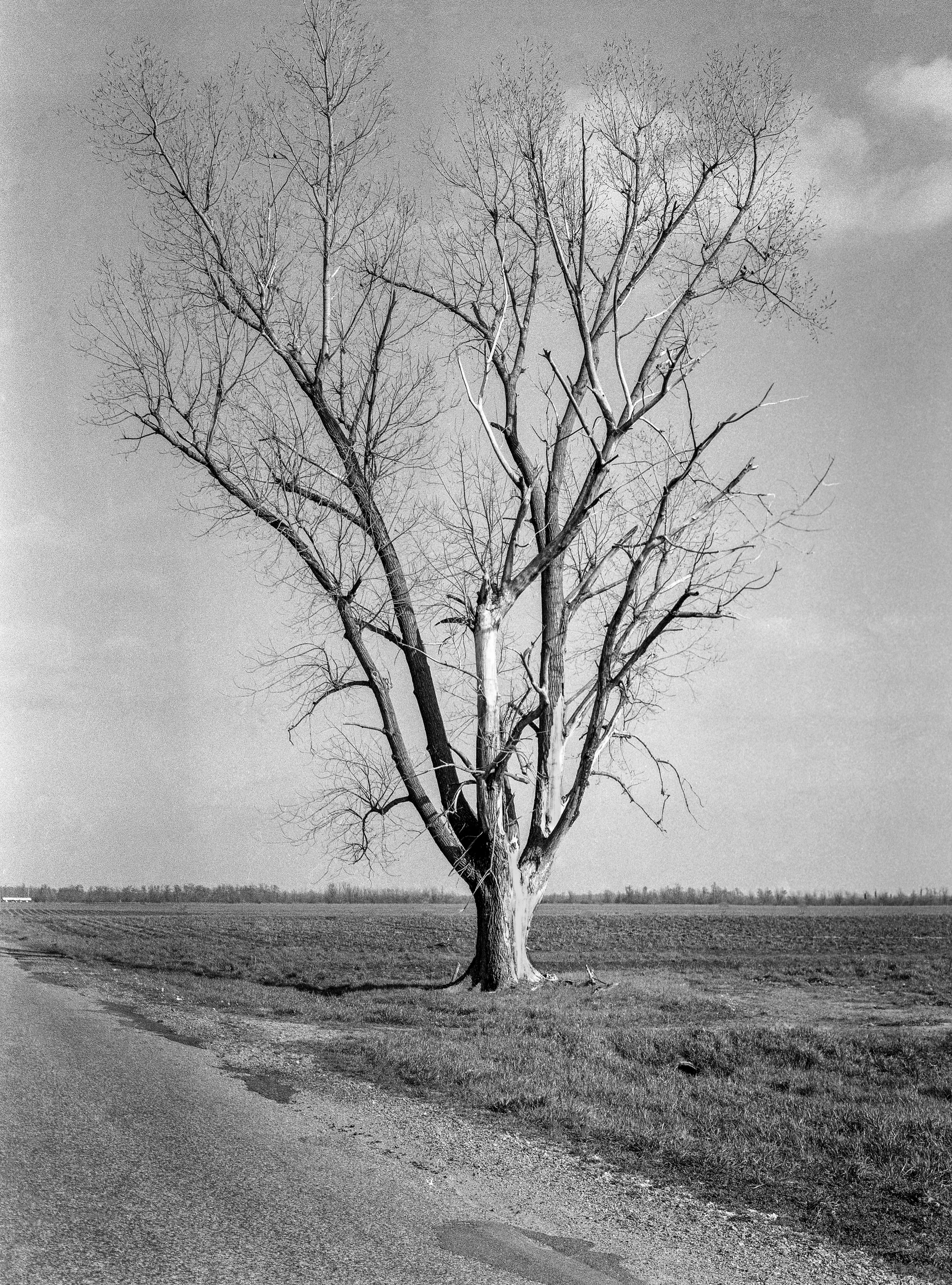
Everyone driving Highway 49 saw the planes coming in low and fast. The ag-pilots had come to say goodbye to Billy Ray Kent and pay their respects to his family. Everywhere people flew and worked on the little yellow Air Tractors, they knew the legend of Billy Ray. He flew tens of thousands of hours and died in his airplane. A heart attack, most likely. People loved him. Even his ex-wife wouldn’t say a bad word against his name. He played bass and pedal steel in a series of popular local party bands. Two of his favorite things were chasing turkeys and hunting deer. He loved bird dogs. He died spraying fields near his home base of Sumner. During his funeral a flight of five yellow crop duster Air Tractors came roaring across the “blue, cloud-streaked skies of Tallahatchie County,” as his obituary read. The Delta from above looks like a quilt of greens and browns, framed in the red gravel or black tarmac of the roads. The airplanes came right over the top of the funeral, and the lead pilot switched on his white trailing smoke and pulled back on the stick and rose towards heaven, flying the missing man.
Every time people come to visit me, the first drive we take is down the Stovall Road. Then, once we get to Highway 1, I can get anywhere in the Delta. Sometimes we’ll cross the levee to the Old River boat landing, where we had bonfire parties in high school. Other times I’ll go to the abandoned mansion out from Perthshire, or take them to our hunting camp on Concordia Island, where Frank and Mary Hamilton first lived in Mississippi. It’s easy to cut across the farms on 444 to Duncan, or 32 to Shelby, the road leading past my grandparents’ graves. My grandfather, Dr. William McKenzie, farmed cotton. He got the Manchester Guardian delivered to his home. He outlived every cancer diagnosis by years because he wanted to see my mom graduate from Vanderbilt. He made it, then took her to Europe, where he managed to get a Centre Court ticket to the Championships at Wimbledon. On the flight home, a tumor broke his leg and he went straight from the Memphis airport to a hospital bed, which he never left. He died not long after they got home, during the 1969 baseball season. In the hospital he’d watch games on television. He loved the underdog Mets but did not live to see them win the World Series. After the ast out, my mom instinctively shouted, “Daddy, they did it!” before she realized he wasn’t there to hear.
Muddy Waters drove down Stovall Road one last time after he left the Delta for Chicago in 1943 while his boss, the Colonel, was off at war. His triumphant homecoming was 1949. He’d been touring the Delta. Shelby, Cleveland, Boyle. His band opened the New Roxy in Clarksdale, which is now a juke joint without a roof, owned by a merchant marine who runs a kind of wayward boys and girls home for lost musicians and lovers of the road. One night me and my friend Reya were listening to a band when the owner tapped us on the shoulder and escorted us into her apartment overlooking the open-air room.
Muddy and his band drove through the Delta in a van. The Colonel asked if Muddy would play a party at the big house. About 30 people came. The Colonel paid everyone in the band seven or eight dollars each. Muddy Waters jammed until 5 o’clock in the morning. I read somewhere, maybe in Robert Gordon’s tremendous biography, that the Colonel hung Chinese lanterns in the trees and they glowed all night. Maybe I just imagined that detail. It’s the Delta, after all, and the line between real and pretend is pretty permeable. Muddy Waters was already a star, on his way to legend, and the Colonel had come home from the war but left his boy across the ocean in a foreign field. The cotton industry had in the last five years gone completely mechanical—technology pioneered at a plantation located at the nearby intersection of Highways 61 and 49, not far from Abe’s BAR-B-Q—and soon this whole world would be decoupled from its reason to exist, a man-made landscape destined, once the government checks stopped, to return to nature.
It was a thousand years from now. The lead elements of the recon unit found a graded roadbed that could not have been formed so precisely by nature. A private with a shovel cut through some of the forest floor to find broken diamonds of hard concrete, then the base, then the subbase. Field reports flurried up the chain of command. People had been here before, just like the military and government officials up at the station had suggested, based on the satellite pictures and the surviving histories that had been saved, as the last of the atmosphere bled off into space. A staff sergeant, who’d become well-known in the far-flung intergalactic saloons where soldiers and star-sailors liked to swap war stories, found a metal sign, more than a thousand years old according to their instruments. Any paint or markings had long ago degraded but they had software to find enough trace elements to recreate whatever time had erased. The sergeant gave the metal square to an officer, who got it into a pod and up to the orbital forward operating base, where scientists could get to work.
The men respected the N.C.O., who’d served in hot spots from Mars to Makemake, and the sergeant just shrugged. That evening, the men opened the hot meals sent down in a pod. Jaguars screamed somewhere in the distance, beneath the thousands of stars, and the soldiers felt the same lonely terror that Frank and Mary Hamilton had felt once, in the times before. These men knew everyone up in their home station, and in all the stations spread through the heavens, was following their progress. They were pioneers, the first humans to return to Earth in more than 1,000 years, following the river north from a big harbor. Before the exodus, humans had called it the Mississippi. Only obscure scholars knew all the old names, the states and nations that had collapsed in the years before the exodus. The next morning, they followed that old road bed, which the engineers now conclusively knew had been a major thoroughfare for the lost civilization that once called this place home. The land around them, covered in cypress swamps, stretched out flat to the horizons. During the walk, a message arrived on the sergeant’s communicator. They’d decoded the metal square. Once there had been green reflective words on it that said The Great River Road.
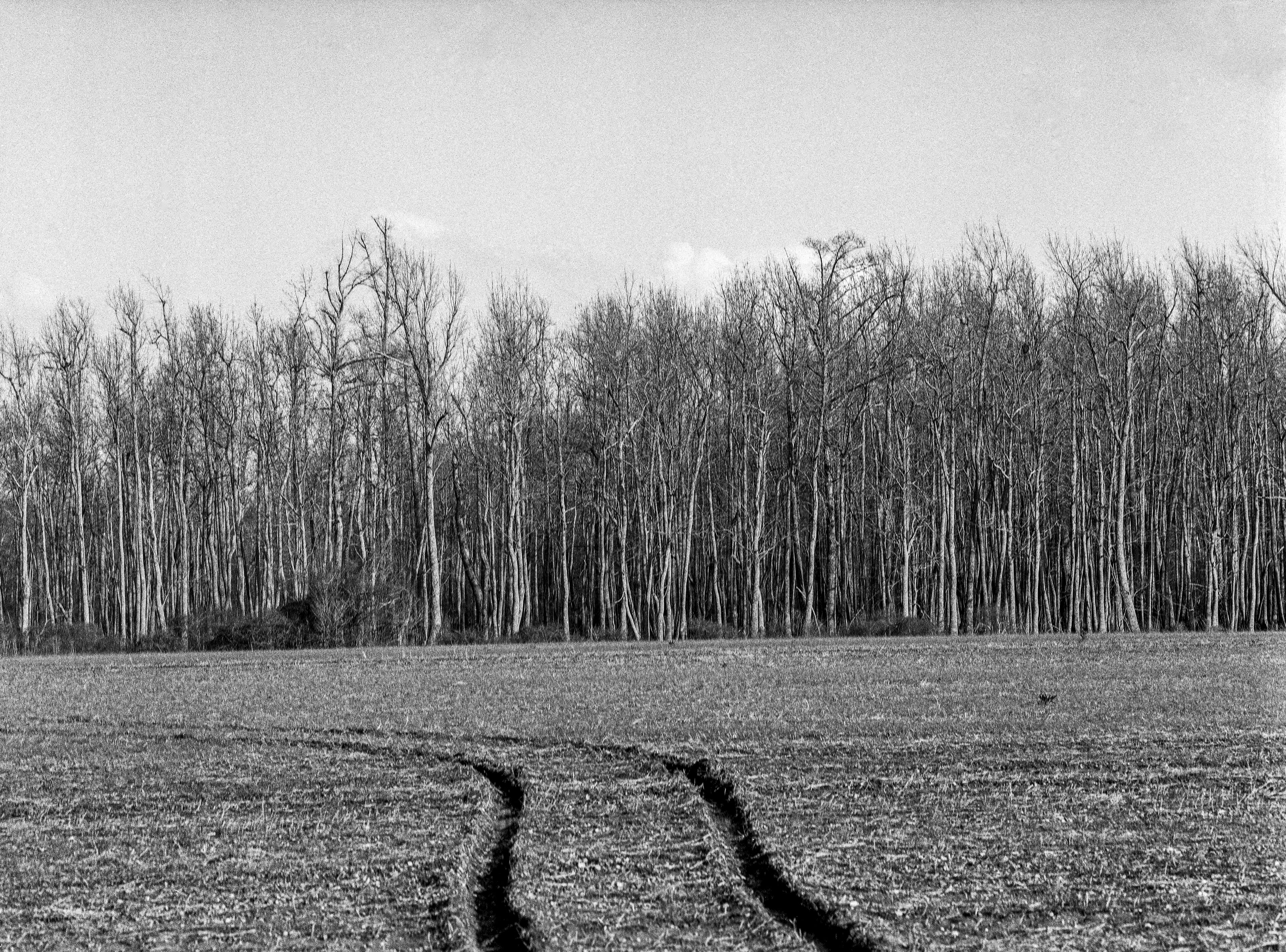
We reclined the Camaro seats so far that the headrest almost touched the speaker box in the hatchback. A red Rally Sport with ground effects and, if memory serves, T-tops. Mikey drove and pressed on the gas in his snakeskin cowboy boots. Linear Power amps drove the Kicker subwoofers. I’m sure they were Kickers. Hold out your hand again. Now imagine your fingers vibrating up and down from the supercharged musical air moving through the car. That’s how loud the speakers boomed. If you’ve ever heard of Boston Acoustics or Polk Audio, you understand what I’m talking about. Of course he had an Alpine deck.
His parents lived in a mansion on top of an Indian mound. His dad was an orthopedic surgeon. Their swimming pool was shaped like a femur. We listened to the bass music we bought at Miro’s Music Shoppe and at the Sound Center. Pump up the volume, pump up the volume. The Camaro whined down Farrell Road, the high-pitched noise giving away the adolescent V-6 instead of the big-boy V8, past the last few sharecropper houses that existed, and we made furious runs south to Rena Lara, on the Great River Road, Highway 1, where we stopped at a Rico’s country store to charge beer to my dad. We smoked Marlboros and thought we’d live forever. Last I heard, Mikey was a traveling nurse. His mom is dead, buried next to the men and women who’d lived in those sharecropper shacks. The house burned down. The swimming pool is filled with rainwater, like the Eggleston pool the duck hunter showed me. During the pandemic I drove out there and found the family’s Jaguar convertible abandoned on a trailer in a washed-out creek bed running along the side of the property. I stopped and remembered all that had risen, and all that had fallen, too. Not long ago I found myself back out there, following the ghost Camaro and the rattling Kicker 12s. The Jaguar is gone. A sign warned strangers to keep out.
I drive away from the Indian mound and the femur-shaped swimming pool and turn on Highway 1, then again on Burnt Cane Road, which cuts through a little hunkered community of trailers and shacks, white folks and Black folks living cheek to jowl and working the same land together. Burnt Cane Road runs through the Colonel’s cotton fields and hits Stovall Road right where Muddy Waters’ house stood, until it got put on display in a museum. I turn right and head back into town, where the road changes names to Oakhurst Avenue when it crosses Lee Drive, past the graveyard where my father is buried, past, past, past.
